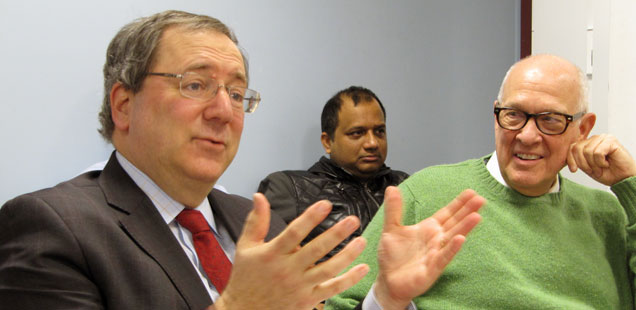March 3, 2015 — David E. Sanger, national security correspondent at The New York Times, discussed key developments and considerations for covering cyberwar and cyberattacks.
Cyberwar is “a non-traditional form of warfare,” said Sanger. Unlike nuclear weapons or drones, the implications of cyberwar and cyberattacks can be difficult to assess, as there are many kinds of attacks of varying sizes, with diverse targets and actors.
Sanger identified three primary motivations behind cyber attacks:
- Espionage. Examples include using computers to tap telephones and steal passwords.
- Economic advantage. Theft of intellectual property from governments, businesses and universities, such as China’s theft of U.S. fighter aircraft designs.
- Political coercion. The U.S./Israel “Operation Olympic Games” was an effort to slow down Iran’s ability to enrich uranium by attacking facilities in Natanz.
Sanger has found that many questions about cyberwar remain unanswered. “Do we have any rules that surround how we use these weapons? Do we have any concept of arms control around these weapons?” he asked. Unlike traditional weapons, cyberattacks can be carried out not only by states, but by criminal groups, corporations – even teenagers. “The old idea of signing treaties doesn’t really work,” said Sanger.
Cyberattacks can be highly unpredictable. If asked a year ago what type of cyberattack would cause conflict between the U.S. and another country, Sanger would have predicted an attack on “the electric power grid in New York, or the cell phone network, or the stock exchange – something that you would consider critical to the operations of the country.” Instead, it ended up being North Korea’s cyber attack on Sony Pictures.
Sanger observed two important developments in the wake of recent cyber conflicts:
A widening divide between Silicon Valley and the U.S. government. “Post-Snowden, companies are racing to show that they are no longer going to cooperate with the U.S. government, because they think that if they do, it will kill their ability to sell their products overseas,” said Sanger.
U.S. government secrecy about its own cyberweapons. With nuclear, chemical, and biological weapons, “it was obvious what the results were,” said Sanger. Yet, the U.S. government has not been forthcoming about its offensive cyber capabilities, despite billions of dollars of investment in them, said Sanger.
“You can’t begin to have a conversation about how you’re going to control these, until you start off by admitting that you have them, and talking about the conditions under which you might use them…that’s been a major journalistic issue.”
Hear Sanger discuss what is known about the U.S.’s cyber warfare capabilities, why tracking cyber attacks is so difficult, how The New York Times makes editorial decisions about cyber attack coverage, and his thoughts on Netanyahu’s speech to Congress in the full audio recording above.
Article and photo by Nilagia McCoy of the Shorenstein Center.


